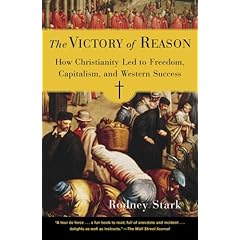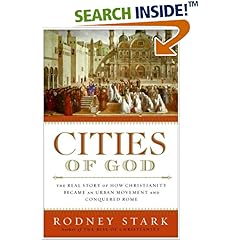 The Victory of Reason: How Christianity Led to Freedom, Capitalism, and Western Success (Random House, 2006). Stark contends that Christianity is a forward-looking religion, evincing faith in progress and in its followers' abilities to understand God over time. Such a future-based rational theology has encouraged the development of technical and organizational advances, such as the monastic estates and universities of the Middle Ages. Stark contends that these developments transformed medieval political philosophy so that democracy developed and thrived in those states, such as northern Italy, that lacked despots and encouraged moral equality. Stark concludes by maintaining that Christianity continues to spread in places like Africa, China and Latin America because of its faith in progress, its rational theology and its emphasis on moral equality. While some historians are likely to question Stark's conclusions, his deftly researched study will force them to imagine a new explanation for the rise of capitalism in Western society (from Publishers Weekly).
The Victory of Reason: How Christianity Led to Freedom, Capitalism, and Western Success (Random House, 2006). Stark contends that Christianity is a forward-looking religion, evincing faith in progress and in its followers' abilities to understand God over time. Such a future-based rational theology has encouraged the development of technical and organizational advances, such as the monastic estates and universities of the Middle Ages. Stark contends that these developments transformed medieval political philosophy so that democracy developed and thrived in those states, such as northern Italy, that lacked despots and encouraged moral equality. Stark concludes by maintaining that Christianity continues to spread in places like Africa, China and Latin America because of its faith in progress, its rational theology and its emphasis on moral equality. While some historians are likely to question Stark's conclusions, his deftly researched study will force them to imagine a new explanation for the rise of capitalism in Western society (from Publishers Weekly). The Rise of Christianity: How the Obscure, Marginal, Jesus Movement Became the Dominant Religious Force (Harper Collins, 1997).
The Rise of Christianity: How the Obscure, Marginal, Jesus Movement Became the Dominant Religious Force (Harper Collins, 1997). For the Glory of God: How Monotheism Led to Reformations, Science, Witch-Hunts, and the End of Slavery (Princeton University Press, 2004). In One True God: Historical Consequences of Monotheism, sociologist of religion Stark examined the nature of God, the wrath of God, the kingdom of God, the grace of God and the "chosen" of God. In this follow-up volume to his ambitious magnum opus, Stark investigates the role of monotheistic religions in reformations, witch-hunts, slavery and science. Such efforts represent an attempt by monotheistic religions to preserve the idea of the One True God against corrupting influences inside and outside the religions themselves. Stark asserts that, contrary to traditional notions, no single religious reformation can be isolated in any monotheistic religion. Thus, Christianity has experienced not simply the Reformation of Luther but many and various reformations that resulted in a diversity of sectarian movements that practice the worship of the One True God in their own ways. Stark also argues that science could have evolved only out of a monotheistic culture that viewed the world as God's handiwork, and that the witch-hunts of Europe could have taken place only in a culture marred by religious conflict and motivated by the desire to displace heretical religious sects. Despite its purported general focus on monotheistic religions, however, the book devotes very little attention to Islam or Judaism, a serious omission in a study that claims to cover so much ground. In addition, Stark's turgid prose and social-scientific style mar what otherwise could have been an engaging study (from Reed Business Information).
For the Glory of God: How Monotheism Led to Reformations, Science, Witch-Hunts, and the End of Slavery (Princeton University Press, 2004). In One True God: Historical Consequences of Monotheism, sociologist of religion Stark examined the nature of God, the wrath of God, the kingdom of God, the grace of God and the "chosen" of God. In this follow-up volume to his ambitious magnum opus, Stark investigates the role of monotheistic religions in reformations, witch-hunts, slavery and science. Such efforts represent an attempt by monotheistic religions to preserve the idea of the One True God against corrupting influences inside and outside the religions themselves. Stark asserts that, contrary to traditional notions, no single religious reformation can be isolated in any monotheistic religion. Thus, Christianity has experienced not simply the Reformation of Luther but many and various reformations that resulted in a diversity of sectarian movements that practice the worship of the One True God in their own ways. Stark also argues that science could have evolved only out of a monotheistic culture that viewed the world as God's handiwork, and that the witch-hunts of Europe could have taken place only in a culture marred by religious conflict and motivated by the desire to displace heretical religious sects. Despite its purported general focus on monotheistic religions, however, the book devotes very little attention to Islam or Judaism, a serious omission in a study that claims to cover so much ground. In addition, Stark's turgid prose and social-scientific style mar what otherwise could have been an engaging study (from Reed Business Information). Cities of God: The Real Story of How Christianity Became an Urban Movement and Conquered Rome (Harper Collins, 2006). Contemplating the rapid spread of early Christianity, Lucian the Martyr marveled in the fourth century that "almost the greater part of the world is now committed to this truth, even whole cities." To explain Christianity's remarkable success in capturing the cities of the Roman Empire, Stark deploys an empirical social science that exposes the flaws in previous historical theorizing. By parsing records of church construction, inscriptions on tombs, and names on imperial contract permits, Stark converts plausible conjectures into testable hypotheses about the growth of Christianity in the 31 largest Roman cities. And while some of the statistically validated hypotheses fit within conventional wisdom, others compel fresh thinking. The traditional belief that Christianity spread through mass conversion, for instance, gives way to a numerically substantiated dynamics of person-to-person conversion. And despite recent acclaim for the Gnostics as the true early Christians, the evidence links the Gnostic impulse to dying pockets of stubborn paganism, not the rising new faith. Like Stark's Victory of Reason (2005), this book will spark controversy--the kind that attracts curious readers. (Bryce Christensen).
Cities of God: The Real Story of How Christianity Became an Urban Movement and Conquered Rome (Harper Collins, 2006). Contemplating the rapid spread of early Christianity, Lucian the Martyr marveled in the fourth century that "almost the greater part of the world is now committed to this truth, even whole cities." To explain Christianity's remarkable success in capturing the cities of the Roman Empire, Stark deploys an empirical social science that exposes the flaws in previous historical theorizing. By parsing records of church construction, inscriptions on tombs, and names on imperial contract permits, Stark converts plausible conjectures into testable hypotheses about the growth of Christianity in the 31 largest Roman cities. And while some of the statistically validated hypotheses fit within conventional wisdom, others compel fresh thinking. The traditional belief that Christianity spread through mass conversion, for instance, gives way to a numerically substantiated dynamics of person-to-person conversion. And despite recent acclaim for the Gnostics as the true early Christians, the evidence links the Gnostic impulse to dying pockets of stubborn paganism, not the rising new faith. Like Stark's Victory of Reason (2005), this book will spark controversy--the kind that attracts curious readers. (Bryce Christensen).I am currently reading Cities of God and enjoying it. Stark takes a dig at the "Jesus Seminar", he contends that Paul was a missionary to the Jewish Diaspora, he contends that Gnosticism was a failed attempt to paganize Christianity, paganism was not stamped out by state represssion but gradually faded away, and the cult of Mithraism posed no competing alternative to Christianity.




1 comment:
Thanks, Michael, for drawing attention to Stark's work. A breath of fresh air in an arid land.
I cite Stark's work in a post of mine:
http://ancienthebrewpoetry.typepad.com/ancient_hebrew_poetry/2007/07/stanley-fish-wi.html
I will add a link to your post there.
John
ancienthebrewpoetry.typepad.com
Post a Comment